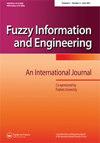Imperialist Competitive Algorithm Optimised Adaptive Neuro Fuzzy Controller for Hybrid Force Position Control of an Industrial Robot Manipulator: A Comparative Study
IF 1.3
Q2 MATHEMATICS, APPLIED
引用次数: 2
Abstract
Due to the nonlinear nature of the dynamics of a robot manipulator, controlling the robot meticulously is a challenging issue for control engineers. The key purpose of this paper is to provide an accurate intelligent method for refining the functionality of orthodox PID controller in the problem of force/position control of a robot manipulator with unspecified robot dynamics during external disturbances. A grouping of imperialist competitive algorithm (ICA) and adaptive neuro fuzzy logic is applied for the tuning of PID parameters. This, therefore, forms an intelligent structure, adaptive neuro fuzzy inference system with proportional derivative plus integral (ANFISPD + I) controller, which is more precise in definite and indefinite circumstances. To show the efficiency of the proposed method, this algorithm is applied to solve constrained dynamic force/position control problem of PUMA robot manipulator. The simulated results are compared to those achieved from other evolutionary techniques such as Genetic Algorithm (GA) and Particle Swarm Optimisation (PSO). The simulation results exhibit that ICA-based ANFISPD + I outperforms the other evolutionary techniques. Highlights An ICA-ANFISPD + I-based hybrid force/position controller has been proposed. Easy to implement. Works well in the case of disturbances. Actuator Dynamics has been considered. External disturbances have been considered. Robot dynamics are unknown.帝国竞争算法优化自适应神经模糊控制器在工业机械臂混合力位置控制中的比较研究
由于机器人机械臂动力学的非线性特性,对机器人的精细控制是控制工程师面临的一个具有挑战性的问题。本文的主要目的是提供一种精确的智能方法来完善传统PID控制器在外部干扰下未指定机器人动力学的机器人机械臂力/位置控制问题中的功能。采用一组帝国主义竞争算法(ICA)和自适应神经模糊逻辑对PID参数进行整定。这就形成了一个具有比例导数加积分(ANFISPD + I)控制器的智能结构自适应神经模糊推理系统,在确定和不确定情况下都更加精确。为验证该方法的有效性,将该算法应用于PUMA机器人机械手的约束动态力/位置控制问题。模拟结果与其他进化技术如遗传算法(GA)和粒子群优化(PSO)的结果进行了比较。仿真结果表明,基于ica的ANFISPD + I优于其他进化技术。提出了一种基于ICA-ANFISPD + i的混合力/位置控制器。易于实现。在有干扰的情况下效果很好。执行器动力学已被考虑。考虑了外部干扰。机器人动力学是未知的。
本文章由计算机程序翻译,如有差异,请以英文原文为准。
求助全文
约1分钟内获得全文
求助全文
来源期刊

Fuzzy Information and Engineering
Mathematics-Logic
CiteScore
2.30
自引率
0.00%
发文量
13
审稿时长
40 weeks
期刊介绍:
Fuzzy Information and Engineering—An International Journal wants to provide a unified communication platform for researchers in a wide area of topics from pure and applied mathematics, computer science, engineering, and other related fields. While also accepting fundamental work, the journal focuses on applications. Research papers, short communications, and reviews are welcome. Technical topics within the scope include: (1) Fuzzy Information a. Fuzzy information theory and information systems b. Fuzzy clustering and classification c. Fuzzy information processing d. Hardware and software co-design e. Fuzzy computer f. Fuzzy database and data mining g. Fuzzy image processing and pattern recognition h. Fuzzy information granulation i. Knowledge acquisition and representation in fuzzy information (2) Fuzzy Sets and Systems a. Fuzzy sets b. Fuzzy analysis c. Fuzzy topology and fuzzy mapping d. Fuzzy equation e. Fuzzy programming and optimal f. Fuzzy probability and statistic g. Fuzzy logic and algebra h. General systems i. Fuzzy socioeconomic system j. Fuzzy decision support system k. Fuzzy expert system (3) Soft Computing a. Soft computing theory and foundation b. Nerve cell algorithms c. Genetic algorithms d. Fuzzy approximation algorithms e. Computing with words and Quantum computation (4) Fuzzy Engineering a. Fuzzy control b. Fuzzy system engineering c. Fuzzy knowledge engineering d. Fuzzy management engineering e. Fuzzy design f. Fuzzy industrial engineering g. Fuzzy system modeling (5) Fuzzy Operations Research [...] (6) Artificial Intelligence [...] (7) Others [...]
 求助内容:
求助内容: 应助结果提醒方式:
应助结果提醒方式:


